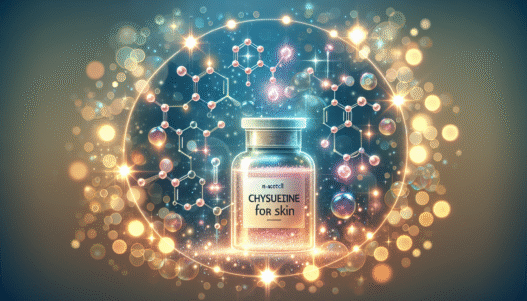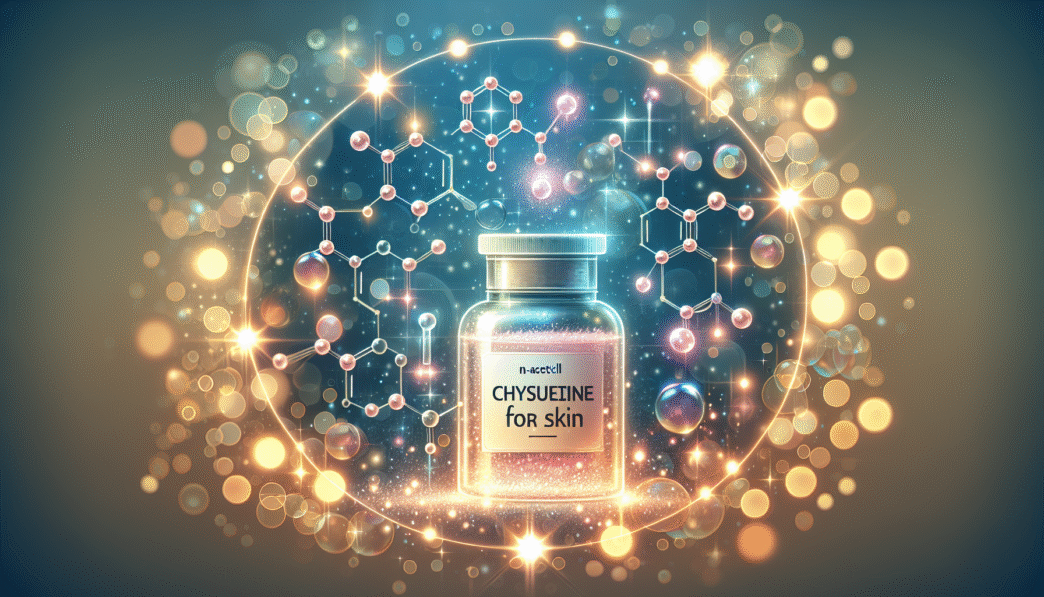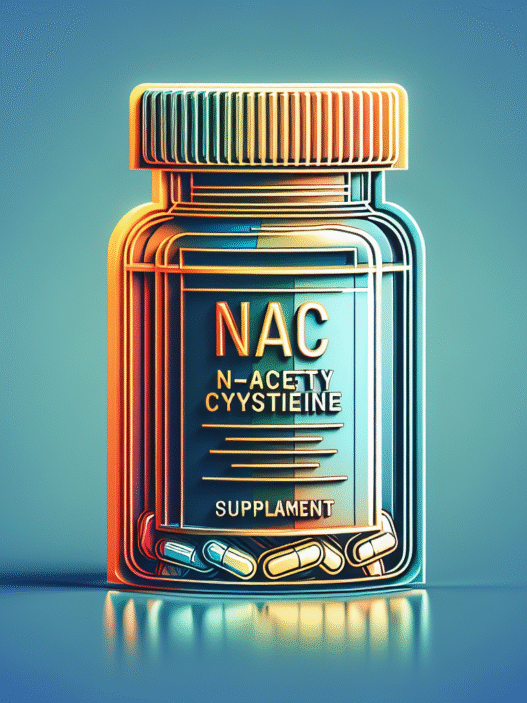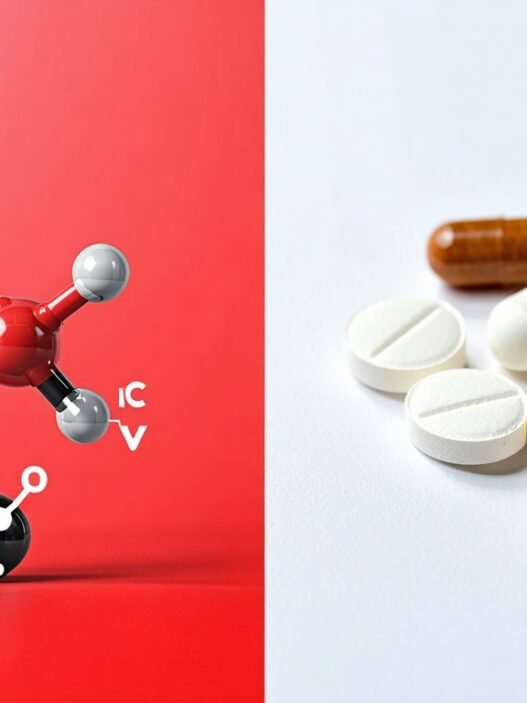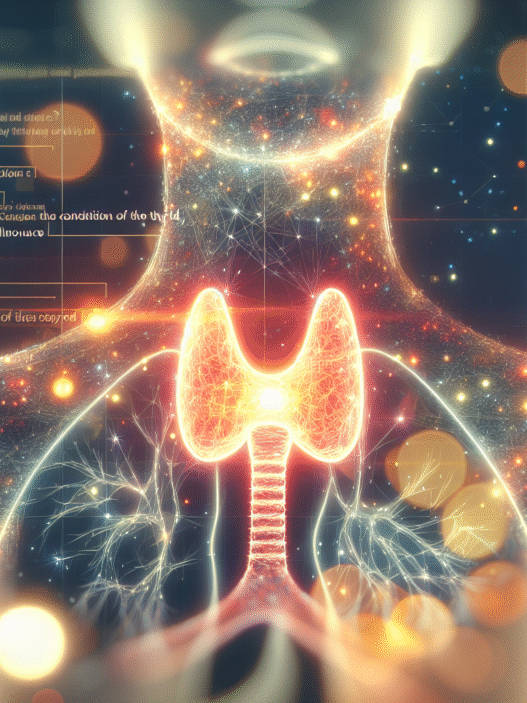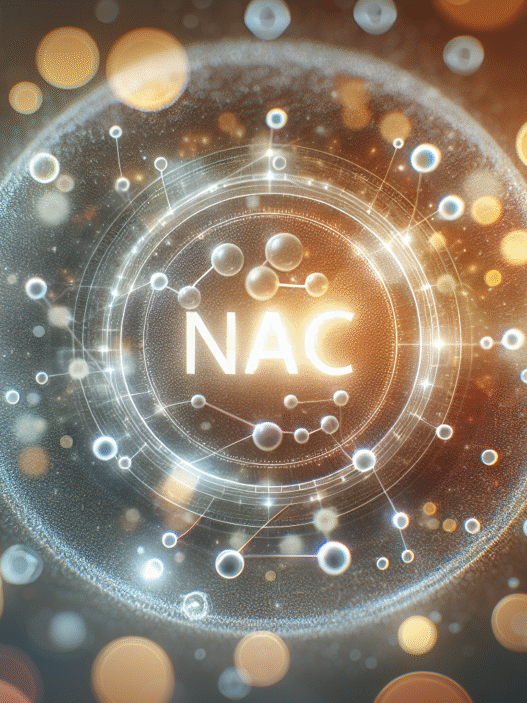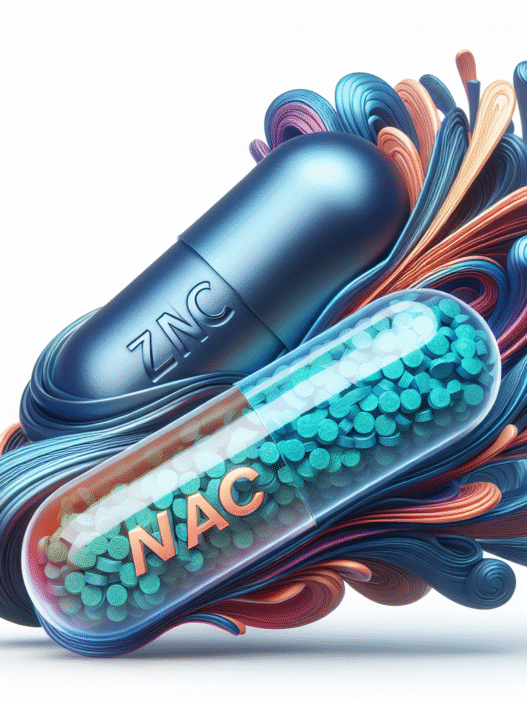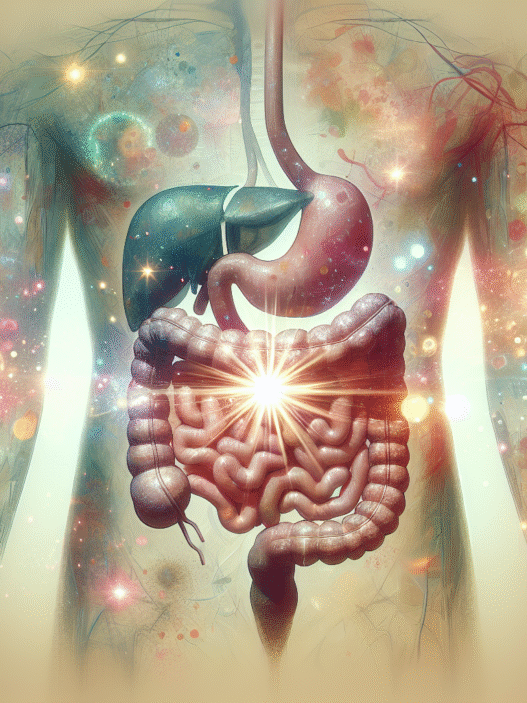Understanding N-Acetyl Cysteine (NAC)
What is NAC?
N-Acetylcysteine (NAC) is a derivative of the amino acid cysteine, recognized for its potent antioxidant properties. It plays a crucial role in neutralizing free radicals, protecting cells against environmental damage, and supporting the body’s detoxification processes (City Skin Clinic). NAC’s importance extends beyond mere supplementation, as it is a precursor to glutathione, a powerful antioxidant produced naturally in the body.
| Property | Description |
|---|---|
| Chemical Structure | Derived from cysteine |
| Primary Function | Antioxidant support |
| Glutathione Connection | Precursor to glutathione |
Role of NAC in the Body
In the body, NAC serves several important functions:
-
Antioxidant Production: NAC is essential for synthesizing glutathione, which helps neutralize free radicals and supports the immune system. This can potentially reduce the risk of chronic diseases such as cardiovascular issues (Healthline).
-
Detoxification: NAC plays a vital role in detoxification processes, particularly in the liver and kidneys. It helps prevent damage caused by environmental toxins and is used in clinical settings to mitigate organ damage, especially in cases of acetaminophen overdose.
-
Protective Effects: The antioxidant activity of NAC helps protect cells from oxidative damage triggered by factors such as UV exposure and pollution. This protection is vital for maintaining skin health and potentially mitigating signs of aging.
NAC is not only significant for general health but also shows promise in enhancing skin vitality, making it a popular ingredient in various skincare formulations. For those interested in exploring its effects on skin rejuvenation, more information can be found on N-acetyl cysteine skin health.
Benefits of NAC for Skin
N-Acetyl Cysteine (NAC) is gaining attention not only for its internal health benefits but also for its positive effects on skin health. This section will explore how NAC plays a role in skincare and its overall impact on the complexion.
NAC in Skincare
NAC enhances the properties of various skincare ingredients, amplifying their effectiveness and thus promoting a smoother, brighter, and more youthful appearance (City Skin Clinic). It is particularly noted for its ability to strengthen the skin’s protective and regenerative abilities by linking to glutathione production, which serves as a potent antioxidant. By shielding skin cells from environmental damage, NAC contributes to a balanced complexion that is hydrated and even-toned.
Here’s a comparison of NAC’s concentration in topical forms versus its benefits in skincare applications:
| Form of NAC | Typical Concentration | Benefits |
|---|---|---|
| Topical Creams | 2-10% | Strengthens skin barrier, enhances hydration, improves overall complexion |
| Serums | 5-15% | Amplifies effects of other ingredients, reduces appearance of blemishes |
| Powders | 10-100% | High efficacy for skin rejuvenation when mixed with other products |
Impact on Skin Health
The impact of NAC on skin health extends beyond its antioxidant properties. It has shown promise in treating various dermatological conditions including acne vulgaris, atopic dermatitis, and other skin disorders. Studies indicate that topical NAC treatments can reduce comedone counts in acne and improve scaling in conditions like lamellar ichthyosis. Additionally, NAC has beneficial effects on wound healing, as it promotes angiogenesis and enhances the expression of vascular endothelial growth factor (VEGF), leading to better recovery in skin injuries.
Table summarizing NAC’s effectiveness in different skin conditions:
| Skin Condition | Observed Benefits |
|---|---|
| Acne Vulgaris | Reduced comedone counts, fewer breakouts |
| Atopic Dermatitis | Decreased inflammation and irritation |
| Wound Healing | Improved healing rates and strength of healed skin |
Topical applications of NAC have been associated with faster recovery from various skin issues, highlighting its role in both treating and preventing skin blemishes.
As interest grows in the use of NAC within skincare routines, its anti-aging effects and connection to enhancing skin vitality continue to solidify its position as a valuable ingredient in the quest for healthy skin. More information can be found regarding specific applications of NAC on our page about n-acetyl cysteine for skin.
Medical Uses of NAC
N-Acetyl Cysteine (NAC) has established itself as a versatile compound in the medical field, benefiting individuals in various ways. Its traditional applications have paved the way for modern healthcare.
Traditional Medical Applications
Historically, NAC has been utilized in medicine primarily for its detoxification properties and its role in managing various health conditions. Its uses include:
- Supporting Detoxification: NAC is well-known for aiding the body in detoxifying harmful substances. It helps the liver process toxins, making it valuable in cases of poisoning or overdose.
- Psychiatric Conditions: NAC has been studied for its potential benefits in managing certain psychiatric disorders, including bipolar disorder and obsessive-compulsive disorder (OCD).
- Polycystic Ovarian Syndrome (PCOS): Some studies suggest that NAC may help regulate menstrual cycles and improve insulin sensitivity in women with PCOS.
- Reducing Oxidative Stress: NAC acts as an antioxidant, combating oxidative stress in the body, which is critical for overall health.
Recent developments have expanded NAC’s applications to skincare, highlighting its growing popularity in topical formulations.
Modern Healthcare Utilization
In contemporary medicine, NAC continues to be recognized for its wide array of applications:
- Respiratory Conditions: NAC is employed to manage chronic obstructive pulmonary disease (COPD) and improve lung function by reducing mucus viscosity.
- Kidney Protection: It has been explored for preventing contrast-induced nephropathy during imaging procedures, helping protect kidney health.
- Pregnancy Complications: NAC may benefit patients experiencing unexplained recurring pregnancy loss, providing new avenues for treatment.
| Use | Traditional Applications | Modern Healthcare Applications |
|---|---|---|
| Detoxification | Yes | Yes |
| Psychiatric Disorders | Yes | Limited |
| PCOS Management | Yes | Limited |
| Respiratory Support | No | Yes |
| Kidney Protection | No | Yes |
| Pregnancy Complications | No | Yes |
NAC’s impact in both traditional and modern medical realms demonstrates its versatility and effectiveness. By linking its benefits to n-acetyl cysteine for skin, individuals can explore further how this compound serves both internal health and external beauty needs, offering a holistic approach to health and wellness.
Potential Health Effects of NAC
N-Acetyl Cysteine (NAC) has gained attention for its multiple health applications, particularly in supporting liver health and promoting detoxification within the body.
Impact on Liver Health
NAC plays a vital role in maintaining liver health. It is crucial for the synthesis of glutathione, a potent antioxidant that helps neutralize free radicals and protect cells from oxidative stress (Healthline). This property is essential for reducing the risk of chronic diseases, including cardiovascular conditions.
In clinical settings, NAC is utilized as an antidote for acetaminophen-induced liver damage, effectively minimizing harm caused by overdoses. The compound has been shown to replenish glutathione levels in the liver, offering protective effects against toxins and supporting overall liver function.
| Health Benefit | Mechanism of Action |
|---|---|
| Liver Protection | Boosts glutathione levels, reducing oxidative damage |
| Detoxification Support | Aids in neutralizing environmental toxins |
| Acetaminophen Overdose | Serves as an antidote, preventing liver damage |
Detoxification Benefits
NAC is recognized for its significant detoxification benefits. It assists the body in eliminating harmful substances by participating in various detoxification processes. This capability is particularly beneficial for preventing kidney and liver damage from toxins.
By enhancing glutathione production, NAC helps the body manage and expel heavy metals, chemicals, and other harmful compounds more efficiently. This antioxidative action is key for individuals seeking to enhance their detoxification regimen and improve overall health.
The benefits of NAC extend beyond the liver, making it valuable in holistic health practices. For more information about the advantages of N-acetyl cysteine, explore our article on n-acetyl cysteine benefits.
Overall, incorporating NAC into one’s health routine may provide crucial support for liver function and detoxification, revealing its potential as a complementary approach for those concerned about longevity and overall well-being.
Considerations and Precautions
When considering the use of N-Acetyl Cysteine (NAC), particularly for skin benefits, it is crucial to understand potential interactions with medications and possible adverse effects.
Interactions with Medications
NAC can affect the efficacy of certain medications. For instance, it has been observed to interact with medications used for high blood pressure, which might lead to a decrease in blood pressure that could become dangerously low. Monitoring blood pressure closely is advised for individuals taking both NAC and antihypertensive medications (WebMD).
Additionally, individuals should always consult healthcare professionals before combining NAC with any prescribed treatments to avoid unforeseen complications.
Adverse Effects and Risks
While NAC is generally considered safe with a well-established safety profile, it can still lead to several adverse effects, particularly when taken orally. Common gastrointestinal symptoms such as nausea and vomiting may occur in up to 23% of patients. Other administration methods, like intravenous NAC, can also result in symptoms including nausea and potential anaphylactoid reactions. On the other hand, inhaled NAC often shows a better safety profile but has been associated with conditions like bacterial pneumonia and cough.
| Administration Method | Common Adverse Effects |
|---|---|
| Oral | Nausea, Vomiting |
| Intravenous | Nausea, Vomiting, Anaphylactoid Reactions |
| Inhaled | Cough, Bacterial Pneumonia |
It is essential to note that the safety and effectiveness of NAC are dependent on the dosage and administration route. Therefore, individuals interested in using NAC for skin health should consider potential side effects and consult with healthcare providers to determine a suitable approach. Understanding these precautions can enhance the overall effectiveness of NAC as part of a skin care regimen. For more information on the benefits of NAC for the skin, refer to our articles on n-acetyl cysteine benefits for skin and n-acetyl cysteine skin rejuvenation.
NAC in Dermatology
NAC in Dermatological Treatments
N-Acetyl Cysteine (NAC) has emerged as a valuable component in dermatological treatments due to its multifunctional properties. Topical application of NAC has shown benefits for various skin conditions, such as acne vulgaris and lamellar ichthyosis. Studies indicate that NAC treatment resulted in a significant reduction in comedone counts in acne patients and improvements in scaling among those with lamellar ichthyosis.
Additionally, NAC has been effectively used in more complex dermatological issues like toxic epidermal necrolysis (TEN). Research shows it could serve as an alternative treatment option for TEN, leading to improvements in erosive lesions and mucosal damage in patients unresponsive to traditional therapies. The versatility of NAC in treating these conditions showcases its potential as both a topical agent and a systemic adjunct therapy.
| Condition | NAC Benefits |
|---|---|
| Acne Vulgaris | Reduced comedone counts |
| Lamellar Ichthyosis | Improvement in scaling |
| Bullous Morphea | Successful wound healing |
| Toxic Epidermal Necrolysis | Improvement in erosive lesions |
| Other Dermatological Issues | Promising results in various trials |
Efficacy in Skin Conditions
NAC’s efficacy is further enhanced by its photoprotective effects, which can shield melanocytes from UV-induced damage, potentially delaying the onset of UV-induced melanocytic tumors. This characteristic supports its role as a chemopreventive agent in dermatology (PubMed Central).
Furthermore, NAC demonstrates beneficial effects on radiation-induced dermatitis—a key factor for patients undergoing radiation therapy, thereby making it a promising candidate for integrative skincare approaches (PubMed Central).
Overall, NAC represents a compelling option for those looking to enhance their skincare regimen or address specific skin conditions. For more information on the benefits of NAC, you can explore its effects in-depth through our articles on n-acetyl cysteine benefits and n-acetyl cysteine skin rejuvenation.










